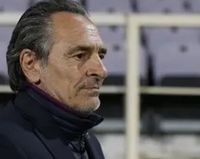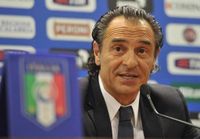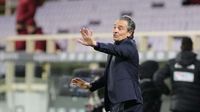In a significant turn of events for Italian football, Cesare Prandelli, the former coach of the national team, is poised for a potential return to the Azzurri, albeit in a new capacity. After stepping down following the disappointing 2014 World Cup in Brazil, Prandelli has been away from the coaching scene for two years. However, reports suggest that he may soon take on the role of technical director for the Italian national team, a position that has yet to be established in Italian football but is common in many other countries.
The news comes as Gabriele Gravina, president of the Italian Football Federation (FIGC), has been advocating for the introduction of a technical director as part of his "Piattaforma programmatica 2025-2028." This initiative aims to enhance the structure and performance of Italian football across all levels. Prandelli, who previously managed the national team from 2010 to 2014, is considered the frontrunner for this pivotal role, with an expected announcement in June 2025.
Prandelli's potential appointment would mark a historic step for Italian football, which has not had a dedicated technical director despite the role being standard in many other footballing nations. If appointed, Prandelli would be responsible for coordinating efforts between the technical sector, youth programs, and the Club Italia, which encompasses all national teams. His experience and vision for the game could provide the much-needed direction for the Azzurri as they look to rebuild and improve their standing on the international stage.
However, the FIGC has recently issued a statement denying the imminent appointment of a technical director, asserting that the current structure—including Luciano Spalletti as head coach, Maurizio Viscidi as coordinator of youth national teams, and Gianluigi Buffon’s increasing involvement with Club Italia—provides sufficient support for both the present and future of Italian football. Despite this official stance, the possibility of Prandelli's return remains tantalizingly open.
As the speculation continues, Prandelli is set to engage with the football community at a public meeting in Crema on April 7, 2025. This event, aimed at discussing the development of youth talent in football, will be moderated by Luca Bianchin, a prominent figure from La Gazzetta dello Sport. It promises to be an insightful gathering for coaches and fans alike, offering a glimpse into Prandelli's thoughts on nurturing the next generation of footballers.
Reflecting on his previous tenure, Prandelli is remembered for instilling a strong ethical framework and a possession-based style of play within the national team. His leadership took Italy to the final of the European Championship in 2012, where they ultimately fell to Spain. The values he championed during his time as coach—emphasizing skill development and a commitment to civil engagement—could be vital in shaping the future of the national team.
Daniele De Rossi, a key player in Italy's 2006 World Cup victory, has voiced his support for Prandelli's potential return. He believes that Prandelli's experience and knowledge could greatly benefit the national team, especially in light of recent performances. De Rossi remarked, "I think that adding a man of great wisdom like Prandelli to another knowledgeable figure like Spalletti can only help the national team." His sentiment reflects a growing consensus among fans and analysts that Prandelli's involvement could catalyze a positive shift in the team's fortunes.
As the footballing world watches closely, the upcoming months will be crucial for both Prandelli and the FIGC. The decision to appoint a technical director could redefine the strategic landscape of Italian football, aligning it more closely with international standards. The role, which includes responsibilities such as player recruitment, coaching development, and performance analysis, could be instrumental in revitalizing the national team's approach and effectiveness.
While the FIGC has downplayed the urgency of appointing a technical director, the conversation surrounding Prandelli's candidacy underscores a broader desire for reform within Italian football. With the 2026 World Cup on the horizon, the stakes are high, and the need for a cohesive strategy has never been more pressing.
As fans eagerly await further developments, Prandelli's potential return symbolizes hope for a brighter future for the Azzurri. Whether or not he assumes the role of technical director, his influence on the game and commitment to nurturing talent will undoubtedly leave a lasting impact on Italian football.








